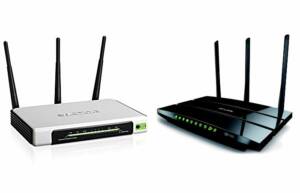Choosing a router is an important step that can have a significant impact on the quality of your home Internet. Making the wrong choice can result in slow speeds, constant disconnections, and other problems that can significantly limit your internet experience. So, to avoid these problems, you need to choose the right router that suits your needs. If you don't know how to choose the perfect router for your home internet, then don't worry, we have prepared some tips from the professionals. First, determine your needs: how many devices will connect to the router, how much data you will use, how far the devices are from the router, etc. Secondly, choose a router with suitable speed and relevant features such as dual-band Wi-Fi, guest access, anti-hacking, etc. Thirdly, make sure that the router has a sufficient number of ports to connect devices. Finally, do not forget about the brand and reputation of the manufacturer. Well-known and trusted brands such as TP-Link, ASUS, Netgear and D-Link offer a wide range of routers with different features and specifications. And remember that choosing the right router can have a huge impact on the quality of your home Internet, so you shouldn't skimp on this device. When choosing a router for your home Internet, there are several factors to consider. An important parameter is the signal strength that the router can provide. It depends on many factors such as the power of the antennas, the number of antennas and the type of technology used. Equally important is the data transfer speed, which affects the performance of the entire network. It's worth paying attention to the number of Ethernet ports, which allow you to connect devices to the network, and the presence of USB ports, which can be useful for connecting external devices such as printers or hard drives. Additionally, network security should be considered as there are many threats to network and data security these days. Finally, don't forget about price, which is also an important factor when choosing a router.
Review of popular router models and their features
When choosing a router for your home Internet, it is very important to consider not only its basic characteristics, such as data transfer speed or signal coverage, but also other important factors, including brand, price and additional features.
Some of the most popular router models on the market include the Netgear Nighthawk, Asus RT-AC88U, and TP-Link Archer C7. Each of these models has its own features and benefits, which can be important when choosing the ideal router for your home network.
The Netgear Nighthawk, for example, has high data transfer speeds and supports MU-MIMO technology, which allows you to connect to multiple devices at the same time. The Asus RT-AC88U, on the other hand, offers wide signal coverage and has cloud connectivity, which can be useful for users who store a lot of data in the cloud.
Considered to be a more affordable option, the TP-Link Archer C7 also has high data speeds and good signal coverage. It also provides network security with its guest access feature.
Choosing the perfect router for your home network can be difficult, but considering various factors and features of the models can help you choose the best option for you and your family.
Choosing the ideal router for home use may not be such an easy task. But to make the right choice, you need to understand what type of router is suitable for your needs.
Wi-Fi routers are a great choice for those who want to get wireless internet access at home. They provide a fast and stable Wi-Fi signal throughout the house, allowing multiple devices to connect to the internet at the same time. If you need a router for home use, a Wi-Fi router is the best choice.
LAN routers are routers that provide internet connection via a LAN cable. They are an ideal choice for those who work with large amounts of data or play online games. They provide a stable and fast internet connection, making them a good choice for gamers and people who do heavy work.
If you need a router for home use that will be suitable for both types of connections, then the optimal choice will be a router that supports both types of connections. This will allow you to use Wi-Fi for mobile devices and a LAN cable to connect to desktop computers.
It is important to remember that choosing a router depends on your needs and preferences. But if you understand which type of router is right for your needs, then making the right choice will be much easier.
What budget is needed to buy a quality router for home Internet? This question worries many users who want to get fast and stable Internet access. It all depends on your needs and requirements for the router. If you only use the Internet for browsing the web and sending email, then a cheap router for 1000-2000 rubles is quite suitable. But if you like to play online games or watch movies in high definition, then you will need a more powerful router, which will cost from 3,000 to 8,000 rubles. Do not forget that the quality of the Internet connection depends not only on the router, but also on the provider and the quality of the line. Before purchasing a router, it is recommended that you read reviews from other users and choose the model that is right for you.
Wi-Fi signal strength is one of the most important parameters when choosing a router for home Internet. It determines how strong and stable the signal will be in different parts of your home. The higher the power, the further the signal penetrates through walls, ceilings and other obstacles. So, if you live in a large house or apartment with thick walls, choosing a router with high signal strength will be especially important. However, do not forget about other router parameters, such as data transfer speed, number of antennas, availability of QoS function and others. Ideally, the router you choose should meet your needs for Wi-Fi signal speed and stability.
How to configure your router for maximum performance and security for your home Internet
Setting up your router is an important step to ensure maximum performance and security for your home Internet. First, make sure your router has the latest firmware updates installed. This will fix possible vulnerabilities and improve the performance of the device.
Next, set a complex password to access the router. It is also recommended to enable WPA2 data encryption to protect your network from unauthorized access.
To improve network performance, it is recommended to select the optimal Wi-Fi channel. To do this, you can use special applications for mobile devices that will help determine the most free channel.
It is also important to optimize quality of service (QoS) settings for priority traffic transmission. For example, you can set the highest priority for video and voice calls to make them work more smoothly.
Finally, don't forget to periodically update your Wi-Fi and router passwords to keep your network safe from hackers and cybercriminals.
Read further:






